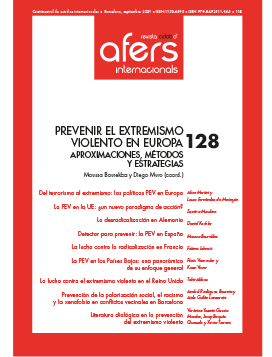El alcance y los límites de la lucha contra el extremismo violento en el Reino Unido
Palabras clave:
radicalización, lucha contra el extremismo violento, islamofobia, la política Prevent, Reino UnidoResumen
Revista CIDOB d’Afers Internacionals, n. 128
Cuatrimestral (mayo-septiembre 2021)
ISSN:1133-6595 - E-ISSN:2013-035X
DOI: doi.org/10.24241/rcai.2021.128.2.155
Este artículo sitúa el debate sobre la política Prevent del Reino Unido en el marco más amplio del paradigma global de lucha para combatir el extremismo violento (CEV) que surgió a finales de 2015. Se argumenta que la omisión de un enfoque matizado sobre las características sociales, culturales, económicas y políticas de las personas radicalizadas ha acarreado una tendencia a introducir medidas generalizadas que inadvertida e indirectamente conducen a resultados perjudiciales. Es más, a pesar de que Prevent ha sido el elemento fundamental de la estrategia antiterrorista del Gobierno británico desde 2006, esta política confunde la resistencia política legítima de los jóvenes musulmanes británicos con indicios de extremismo violento, lo que da credibilidad al argumento de que Prevent es una forma de ingeniería social que, en última instancia, pacifica la resistencia por medio de la reafirmación del statu quo en la política interior y exterior del país.
>> Artículo disponible también en inglés
Citas
Abbas, Tahir. Islamic Radicalism and Multicultural Politics: The British Experience. Londres y Nueva York: Routledge, 2011.
Abbas, Tahir. Islamophobia and Radicalisation: A Vicious Cycle. Londres y Nueva York: Hurst y Oxford University Press, 2019a.
Abbas, Tahir. «Implementing ‘Prevent’ in Countering Violent Extremism in the UK: A Left-Realist Critique». Critical Social Policy, vol. 39, n.° 3 (2019b), p. 396-412.
Abbas, Tahir. Countering Violent Extremism: An International Deradicalization Agenda, Londres y Nueva York: IB Tauris, 2021.
Aistrope, Tim. «The Muslim Paranoia Narrative in Counter-Radicalisation Policy». Critical Studies on Terrorism,vol. 9, n.° 2 (2016), p. 182-204.
Altermark, Niklas y Nilsson, Hampus. «Crafting the “Well-Rounded Citizen”: Empowerment and the Government of Counterradicalization». International Political Sociology, vol. 12, n.° 1 (2018), p. 53-69.
Archer, Toby. «Welcome to the Umma: The British State and Its Muslim Citizens since 9/11». Cooperation and Conflict, vol. 44, n.° 3 (2009), p. 329-347.
Awan, Imran. «COUNTERBLAST: Terror in the Eye of the Beholder: The ‘Spycam’ Saga: Counter-Terrorism or Counter Productive?». The Howard Journal, vol. 50, n.° 2 (2011), p. 199-202.
Awan, Imran y Zempi, Irene. «The Affinity between Online and Offline Anti-Muslim Hate Crime: Dynamics and Impacts». Aggression and Violent Behavior, vol.27 (2016), p. 1-8.
Bertelsen, Preben. «Danish Preventive Measures and De-Radicalization Strategies: The Aarhus Model». Panorama: Insights into Asian and European Affairs 1 (2015), p. 241-253.
Blackbourn, Jessie y Walker, Clive. «Interdiction and Indoctrination: The Counter-Terrorism and Security Act 2015». Modern Law Review, vol. 79, n.° 5 (2016), p. 840-870.
Coppock, Vicki y McGovern, Mark. «Dangerous Minds? Deconstructing Counterterrorism Discourse, Radicalisation and the Psychological Vulnerability of Muslim Children and Young People in Britain». Children Society, vol. 28, n.° 3 (2014), p. 242-256.
Dawson, Lorne L. y Amarasingam, Amarnath. «Talking to Foreign Fighters: Insights into the Motivations for Hijrah to Syria and Iraq». Studies in Conflict and Terrorism, vol. 40, n.° 3 (2017), p. 191-210.
Dekeseredy, Walter S. y Schwartz, Martin D. «Friedman Economic Policies, Social Exclusion, and Crime: Toward a Gendered Left Realist Subcultural Theory». Crime Law and Social Change, vol. 54, n.° 2 (2010), p. 159-170.
Edwards, Phil. «Closure through Resilience: The Case of Prevent». Studies in Conflict and Terrorism, vol. 39, n.° 4 (2016), p. 292-307.
Heath-Kelly, Charlotte. «The Geography of Pre-criminal Space: Epidemiological of Radicalisation Risk in the UK Prevent Strategy, 2007–2017». Critical Studies on Terrorism, vol. 10, n.° 2 (2017), p. 297-319.
Institute for Economics and Peace. Global Terrorism Index 2020: Measuring the Impact of Terrorism. Sydney: IEP, 2020.
Jarvis, Lee y Lister, Michael. «Disconnected Citizenship? The Impacts of Anti-terrorism Policy on Citizenship in the UK». Political Studies, vol. 61, n.° 3 (2012), p. 656-675.
Kundnani, Arun. «Radicalisation: the journey of a concept». Race and Class, vol. 54, n.° 2 (2011), p. 3-25.
Lewis, Hannah y Craig, Gary «“Multiculturalism Is Never Talked About”: Community Cohesion and Local Policy Contradictions in England». Policy and Politics, vol. 42, n.° 1 (2014), p. 21-38.
Lowe, David. «Prevent» Strategies: The Problems Associated in Defining Extremism – The Case of the UK». Studies in Conflict and Terrorism, vol. 40, n.° 11 (2017), p. 917-933.
O’Donnell, Aislinn. «Securitisation, Counterterrorism and the Silencing of Dissent: The Educational Implications of “Prevent”». British Journal of Educational Studies, vol. 1, n.° 64 (2015), p. 53-76.
Qureshi, Asim. «“PREVENT”: Creating «Radicals» to Strengthen Anti-Muslim Narratives». Critical Studies on Terrorism, vol. 8, n.° 1 (2015), p. 181-191.
Ragazzi, Francesco. «Suspect Community or Suspect Category? The Impact of Counterterrorism as “Policed Multiculturalism”». Journal of Ethnic and Migration Studies, vol. 42, n.° 5 (2016), p. 724-741.
Richards, Anthony. «From terrorism to «radicalization» to «extremism»: Counterterrorism imperative or loss of focus?». International Affairs, vol. 91, n.° 2 (2011), p. 371-380.
Schuurman, Bart, Bakker, Edwin y Eijkman, Quirine. «Structural Influences on Involvement in European Homegrown Jihadism: A Case Study». Terrorism and Political Violence, vol. 30, n.° 1 (2016), p. 97-115.
Spalek, Basia. «Radicalisation, De-radicalisation and Counter-Radicalisation in Relation to Families: Key Challenges for Research, Policy and Practice». Security Journal, vol. 29, n.° 1 (2016), p. 39-52.
Thomas, Paul. Responding to the Threat of Violent Extremism: Failing to Prevent. Londres: Bloomsbury, 2012.
Vidino, Lorenzo, Marone, Francesco y Entenmann, Eva. Fear Thy Neighbor: Radicalization and Jihadist Attacks in the West. Leiden: George Washington University’s Program on Extremism. The Hague: The Italian Institute for International Political Studies and the International Centre for Counter-Terrorism, 2017.
Young, Jock. The Exclusive Society: Social Exclusion, Crime and Difference in Late Modernity. Londres: Sage, 1999.
Zempi, Irene y Chakraborti, Neil. Islamophobia, Victimisation and the Veil. Basingstoke: Palgrave-Macmillan, 2014.













